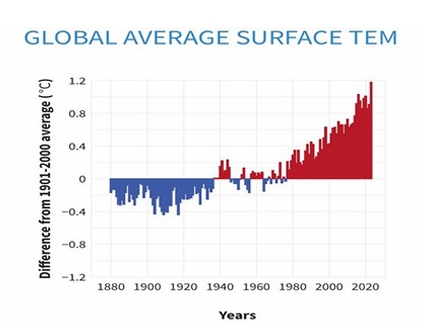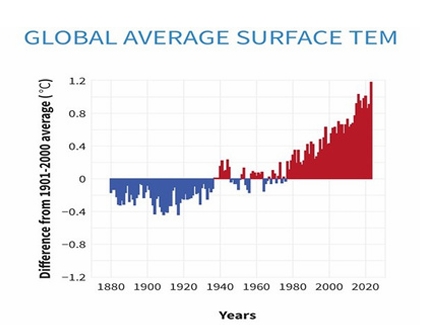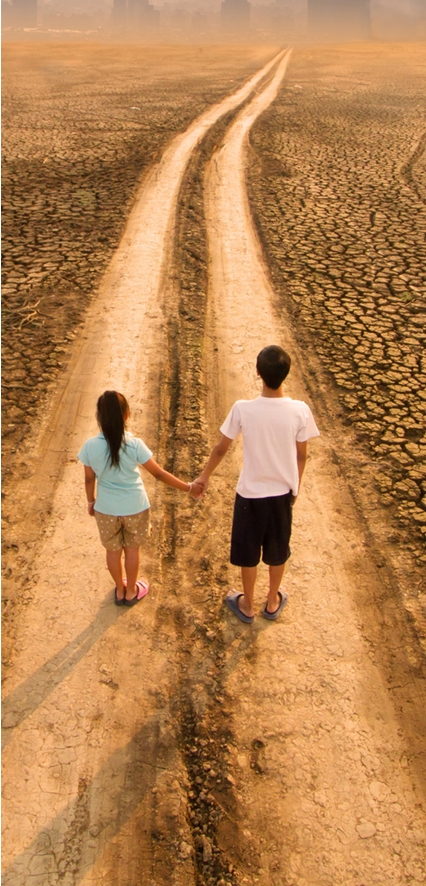
by Halima Hafiz
There is a famous quote by Susan Rice that drives our motivation: “If you want change, you have to make it, but if you want progress, you have to drive it”. Climate change is a pressing global issue with far reaching implications for our planet and future generations. It encompasses changes in temperature, precipitation patterns, sea levels, and other phenomena. It is primarily caused by human activities such as deforestation, burning of fossil fuels, and industrial processes, which release greenhouse gases into the atmosphere. These gases, including carbon dioxide (CO2), nitrous oxide (N2O), and methane (CH4), trap heat from the sun, leading to global warming and subsequent climate disruptions.

2023 marks the first time on record that every day within a year has exceeded 1°C above the 1850-1900 pre-industrial level. Close to 50% of days were more than 1.5°C warmer than the 1850-1900 level, and two days in November were, for the first time, more than 2°C warmer.
Climate change results from human activities, releasing greenhouse gases that trap heat and lead to global warming and climate disruptions. Key facts include a 1.1°C global temperature increase since the pre-industrial era and projections of a 3°C increase by the century’s end without immediate. action, as well as intensified extreme weather events, accelerated sea level rise, biodiversity loss, and impacts on human health. The UNEP Emissions Gap Report emphasizes that current international commitments fall short of necessary greenhouse gas reductions to limit global warming, calling for urgent and ambitious actions from governments, businesses, and individuals. The UN and its member states advocate for collaborative efforts to mitigate greenhouse gas emissions, transition to renewable energy sources, promote sustainable land-use practices, and adapt to the changing climate through initiatives like the Sustainable Development Goals and the Paris Agreement.
The consequences of climate change are increasingly evident and pose a threat to both the present generation and future generations. As we confront this crisis, it is important to recognize the essential role that youth are playing in driving positive change and leading efforts against climate change. Urgent action is needed to mitigate its effects and secure sustainable development. However, amidst this crisis, the youth have emerged as a powerful force for positive change, demonstrating an unwavering commitment to tackling climate change and driving transformative initiatives.
Today’s youth are at the forefront of feeling the direct impacts of climate change. The youth are experiencing the direct impacts of climate change and have shown remarkable passion and determination to address environmental challenges. They are actively involved in various initiatives such as renewable energy advocacy, environmental conservation, sustainable agriculture, climate education, circular economy entrepreneurship, policy engagement, and technology and innovation for climate solutions. Countless youth-led initiatives around the globe are taking proactive steps to combat climate change. From grassroots community projects to cutting-edge technological innovations, young individuals and organizations are making a tangible difference.

The role of today’s youth in raising awareness and advocating for sustainable policies cannot be overstated. Through social media, organized protests, and active engagement with policymakers, young people are amplifying their voices and driving meaningful change. Additionally, education plays a crucial role in empowering youth to understand the science behind climate change and actively participate in shaping a sustainable future.
Successful collaborations between youth, governments, and non-profit organizations are pivotal in addressing climate change. By working together, these entities can leverage unique strengths and resources to implement impactful solutions. Case studies demonstrate how partnerships have contributed to reforestation efforts, community resilience programs, and the development of eco-friendly infrastructure. Cultivating a sense of responsibility and stewardship in future generations is essential for sustained progress in combating climate change. The can be done by integrating environmental education into school curriculums, promoting youth leadership in sustainability initiatives, and fostering a culture of innovation and activism.
Youth represent the driving force in combating climate change, and their contributions are invaluable in shaping a more sustainable future. It is imperative to continue supporting, recognizing, and collaborating with young people, harnessing their energy, creativity, and unwavering commitment to safeguard the planet for generations to come. As we collectively strive for a healthier, more resilient world, the involvement of youth remains instrumental in achieving meaningful and lasting change.
____________________
The author is a student of International Relations at Fatima Jinnah Women, Rawalpindi.

